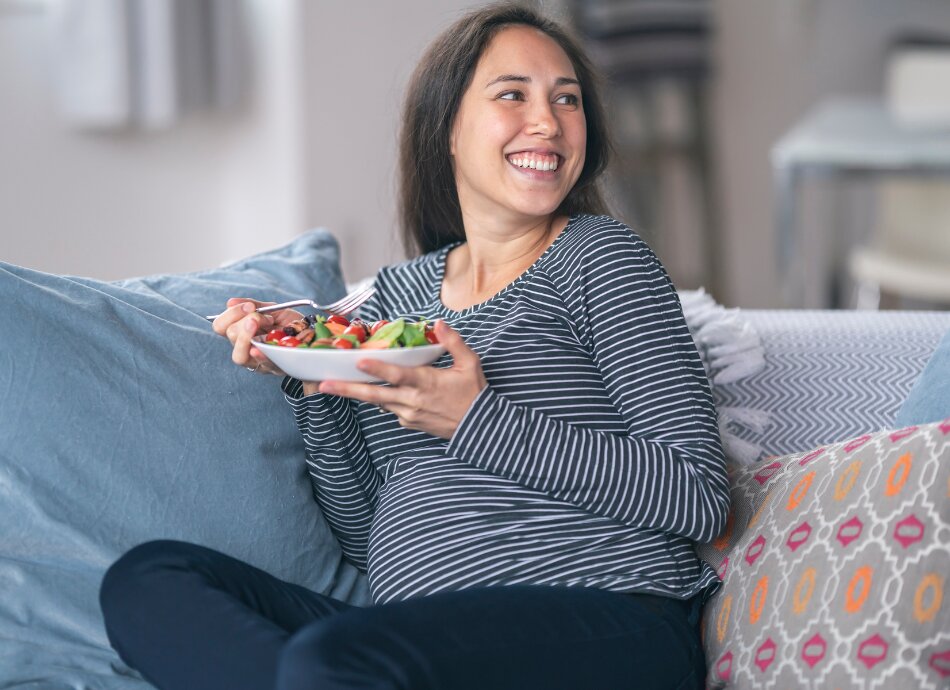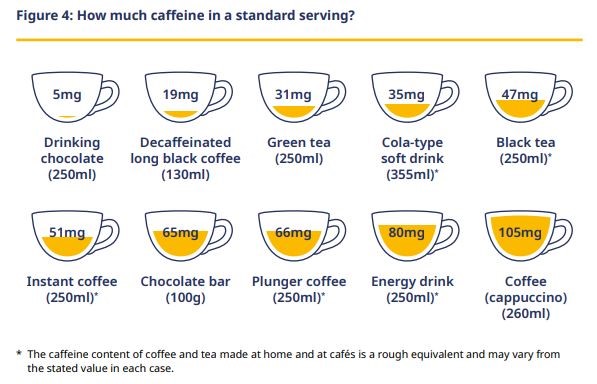Eating, drinking and watching your weight during pregnancy/while hapū
Key points about eating, drinking and watching your weight during pregnancy/while hapū
- Eating a healthy balanced diet when you are pregnant is important for you and your baby.
- The best fluid to drink when you are pregnant is water.
- Although it's important to eat a wide variety of foods to get the nutrients you and your baby need during pregnancy, some foods should be limited or avoided.
- Putting on weight during pregnancy is normal. However, you need to gain the right amount of weight for your body size for a healthy pregnancy, birth and baby.
- Talk to your doctor, midwife or dietitian if you need advice on healthy eating and watching your weight during pregnancy.

During pregnancy your appetite can be affected by pregnancy-related issues such as morning sickness, indigestion or having cravings for certain foods. However, eating a healthy balanced diet is important for you and your baby.
Make sure you eat a variety of foods including:
- plenty of fresh vegetables and fruit
- grain foods, mostly whole grain and those naturally high in fibre
- some milk and milk products, mostly low and reduced fat
- legumes, nuts, seeds, fish and other seafood, eggs, poultry and/or red meat with the fat removed.
Other tips to eat healthily during pregnancy include:
- having small, regular healthy meals and snacks and drinking plenty of fluids (water is best)
- avoiding fatty or spicy food if you have nausea or indigestion
- your family or whānau supporting you by preparing meals for you at home, rather than getting takeaways
- distracting yourself from your pregnancy cravings for less healthy foods by chewing sugarless gum or having a hot drink or healthier snacks.
Folic acid and iodine are the only supplements that all pregnant people need to take.
- Take a folic acid-only tablet (800 micrograms per day) from 4 weeks before you are pregnant until the 12th week of your pregnancy. Ideally you would start this when you are trying to conceive. Some pregnant people, such as those with a BMI over 30, diabetes, epilepsy or with a personal or family history of neural tube defects, should take 5mg of folic acid.
- Take an iodine tablet (150 micrograms) from the start of your pregnancy until you stop breastfeeding.
If you are taking a multivitamin, make sure that it is one specifically for pregnant people (such as Elevit), as some multivitamin tablets contain vitamin A which should not be taken during pregnancy. You should only take supplements on the advice of your doctor or midwife. Talk to your doctor, midwife or dietitian if you think you may have any nutrient deficiencies. If you are a vegan, your healthcare team may advise you take vitamin B12 supplements.
Many pregnant people will need to take iron tablets. However, these are only prescribed when you are low in iron or anaemic and are not given routinely for everyone.
Some pregnant people (particularly those with dark skin, who wear a hajib or live in places with lower sunshine) will be prescribed vitamin D.
If you have risk factors for pre-eclampsia, your doctor or midwife may prescribe you calcium tablets.
Read more about avoiding nutrient deficiencies during pregnancy.
Although it's important to eat a wide variety of foods to get the nutrients you and your baby need during pregnancy, there are some foods that you should avoid or limit. In pregnancy your immunity is lower so you and your unborn baby are more susceptible than usual to food-borne illnesses that affect everyone.
Bacteria such as listeria, salmonella and campylobacter and pathogens such as toxoplasma can cause food-borne illness. When you are pregnant, this can cause infection in you and your baby. In extreme cases, this can cause complications such as miscarriage, stillbirth or premature birth.
Foods to avoid during pregnancy for this reason include:
- chilled ready-to-eat foods such as those bought from a supermarket deli or restaurant buffet unless they are heated until piping hot
- prepared ready-to-eat foods such as store-bought sandwiches where you can’t be certain of product age, storage conditions or the preparer’s food-handling practices
- soft and semi-soft pasteurised cheese, eg, brie, camembert, feta, blue, mozzarella and ricotta
- raw milk (unpasteurised), raw milk cheeses and raw milk yoghurts
- cold cooked or smoked chicken
- processed meats such as ham, pâté, salami and luncheon
- prepared salads including rice or pasta salad, coleslaw, roasted vegetable and green salads
- raw or smoked seafood including sushi, smoked salmon, marinated mussels or oysters
- raw eggs, eg, in smoothies, mayonnaise or desserts like mousse
- soft serve ice cream
- cream or custard especially in pre-made cakes or pastries (unless newly opened or homemade and fresh)
- hummus and other dips containing tahini (which has been linked to both salmonella and listeria infection)
- any food prepared and stored in the fridge for more than 12 hours.
You should avoid alcohol while you are hapu/pregnant. There is no known safe level of alcohol consumption during pregnancy. Read more about pregnancy and alcohol.
Other than avoiding the foods above, you should practice the following when you are pregnant:
- wash your hands with soap and water after being around animals
- avoid handling cat litter, particularly if the cat is pregnant – if you need to handle cat litter, wear gloves
- wear gloves while gardening.
Drinks to avoid or limit include:
- drinks that contain caffeine (eg, energy drinks, cola, coffee)
- herbal teas
- fermented drinks
- sugary drinks, such as juice, flavoured fruit drinks and soft drinks.
You should limit your caffeine intake to below 200mg per day when you are pregnant. Energy drinks and energy shots have high caffeine content, so it's best if you don't drink these while pregnant.
The diagram below shows the approximate caffeine content in each drink.

Image credit: Eating and activity guidelines for New Zealand adults(external link) Health New Zealand | Te Whatu Ora
Some herbal teas may be harmful in pregnancy, such as aloe, buckthorn bark, chamomile, coltsfoot, comfrey, juniper berries, Labrodor tea, lobelia, pennyroyal, sassafras and senna leaves (alpine tea). You should avoid these teas if you are pregnant or breastfeeding.
Some fermented drinks such as kombucha, kefir or kvass can contain low levels of alcohol. If you are pregnant or breastfeeding, it is best to avoid alcohol and any alcohol-containing drinks. Read more about alcohol and pregnancy.
You also need to avoid sugary drinks, because when you are pregnant high amount of hormones such as oestrogen and progesterone can make bacteria grow in your mouth, causing gum inflammation (pregnancy gingivitis). Therefore, good oral health such as brushing and flossing your teeth twice a day is also important.
Although you may feel hungrier in pregnancy, eating for two is not necessary. Nor is it a time to diet, so let your appetite guide you. If you feel hungry, healthy snacks like yoghurt, fruit, washed vegetable sticks, nuts, wholegrain crackers and cheese, and fruit smoothies are great options.
Putting on weight is natural and will help you breastfeed well. The extra weight often comes off when breastfeeding if you maintain a balanced diet. The weight gained in pregnancy is caused by your developing baby, placenta and the amniotic fluid, along with increases in volume of your own body (uterus, breasts, blood and cell fluid and fat stores).
Too much weight gain during pregnancy can increase the chances of high blood pressure, gestational diabetes and having a big baby. Having a big baby can increase the chance of birth complications. Too little weight gain during pregnancy can cause premature birth and a low birthweight baby. Gaining the right amount of weight for your body size increases the chances of you having a healthy pregnancy, normal birth and a healthy baby.
|
It is not recommended to lose weight during pregnancy. |
Keeping track of how much weight you gain is an important part of your pregnancy and your midwife or doctor will check your weight at your antenatal appointments. The amount of weight you should gain depends on your weight before getting pregnant. If you know your normal pre-pregnancy weight, you can calculate your BMI (body mass index) and use the table below to work out what a healthy weight gain should be for you.
Recommended weight gain according to pre-pregnancy BMI
|
Pre-pregnancy BMI |
Recommended total weight gain |
|
Underweight (under 18.5) |
12.5–18kg |
|
Healthy weight (18.5 to 24.9) |
11.5–16kg |
|
Overweight (25 to 29.9) |
7–11.5kg |
|
Obese (above 30) |
5–9kg |
Source: Eating and activity guidelines for New Zealand adults, Ministry of Health, NZ
Here are some tips to help you achieve a healthy weight gain when you are pregnant:
- Eat healthy foods and keep active.
- Drink water rather than sweetened drinks, juices or fizzy drinks.
- You don’t need extra food when pregnant or to ‘eat for two’ even if you are underweight.
- In the first 12 weeks of pregnancy, aim to eat the same amount as usual, focusing on nutritious foods.
- From 12 weeks of pregnancy onwards, you may need extra energy to support your baby’s growth. You can add an extra healthy snack during the day or extra healthy food to a meal. An example of a healthy snack is an apple.
- Prepare and eat meals at home, and aim to reduce takeaway meals to less than once a week.
Your doctor, midwife or dietitian can advise you on the energy requirements that are right for you. They can also ensure the quality of your diet is the best it can be for your pregnancy – quality is every bit as important as quantity.
If you have a BMI that is below 18.5 or above 30 at the start of pregnancy, or you are worried that you are not getting enough nutrients, talk to your doctor, midwife or dietitian for some advice on healthy eating.
The following links provide further information about eating, drinking and watching your weight during pregnancy. Be aware that websites from other countries may have information that differs from New Zealand recommendations.
Pregnancy nutrition(external link) Plunket NZ
Eating for healthy pregnant women(external link) HealthEd, NZ, 2023
Vegan pregnancy and raising vegan kids(external link) Vegan Society of Aotearoa New Zealand
Eating safely and well during pregnancy(external link) Health New Zealand | Te Whatu Ora
Healthy weight gain during pregnancy(external link) HealthInfo,NZ
Healthy weight gain in pregnancy(external link) HealthInfo Canterbury, NZ
Apps
Resources
Eating well during breastfeeding(external link) HPA, NZ, 2021
Being active during pregnancy and breastfeeding(external link) Healthy Kids, NZ, 2019
Why your weight matters during your pregnancy(external link) Royal Australian and New Zealand College of Obstetricians and Gynaecologists, 2017
References
- Eating and activity guidelines for NZ adults(external link) Health New Zealand | Te Whatu Ora, 2020
- Guidance for healthy weight gain in pregnancy(external link) Ministry of Health, NZ, 2014
Eating and activity guidelines for NZ adults(external link) Health New Zealand | Te Whatu Ora, 2020
Guidance for healthy weight gain in pregnancy(external link) Ministry of Health, NZ, 2014
Credits: Healthify editorial team. Healthify is brought to you by Health Navigator Charitable Trust.
Reviewed by: Dr Judy Ormandy, Obstetrician and Gynaecologist, Capital & Coast District Health Board
Last reviewed:
Page last updated:





